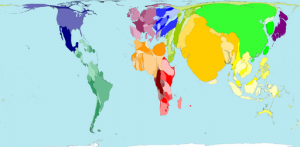[An expanded treatment of some of this material appears in Chapter 3 of the Energy and Human Ambitions on a Finite Planet (free) textbook.]
Sometimes considered a taboo subject, the issue of population runs as an undercurrent in virtually all discussions of modern challenges. Naturally, resource use, environmental pressures, climate change, food and water supply, and the health of the world’s fish and wildlife populations would all be non-issues if Earth enjoyed a human population of 100 million or less.
The subject is taboo for a few reasons. The suggestion that a smaller number would be nice begs the question of who we should eliminate, and who gets to decide such things. Also, the vast majority of people bring children into the world, and perhaps feel a personal sting when it is implied that such actions are part of the problem. I myself come from a long line of breeders, and perhaps you do too.
Recently, participating in a panel discussion in front of a room full of physics educators, I made the simple statement that “surplus energy grows babies.” This is motivated by my recognition that population growth bent upwards when widespread use of coal ushered in the Industrial Revolution and bent again when fossil fuels entered global agriculture in a big way during the Green Revolution. These are really just facets of the broader Fossil Fuel Revolution. I was challenged by a member of the audience with the glaringly obvious statement that population growth rates subside in energy-rich nations—the so-called demographic transition. How do these sentiments square against one another?
So in the spirit of looking at the numbers, let’s explore in particular various connections between population and energy. In the process I will expose the United States, rather than Africa, for instance, as the real problem when it comes to population growth.
Continue reading →
Views: 8351







